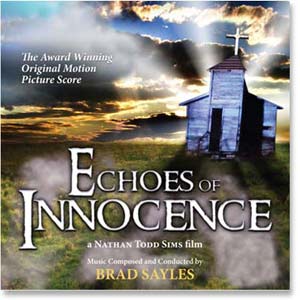Echoes of Innocence
Music composed by Brad Sayles
Featuring The Houston Boychoir (Carole Nelson, director) and Alecia Lawyer (oboe)
Produced by Brad Sayles and Patricia Sayles
Available on Movie Score Media (MMS-06003)
Running Time: 57:00
Available for purchase from iTunes. (click on purchase link at bottom of page)

See also:
Following Crash Moviescore Media’s third internet-only release is the score by Brad Sayles for Nathan Todd Sims’ feature film about a girl torn between two men in her life (one her long-lost first love and the other a new love) who also has visions of Joan of Arc. The film’s plot sounds like a JJ Abrams re-invention of the Cassandra narrative, but it holds a couple of Best Feature trophies from the festival circuit, so there’s probably something more to it than that.
Brad Sayles is a new name to film scoring, the liner notes detailing his prior experience as a recording engineer and the composer of a piece premiered by the Houston Chamber Orchestra called ‘New England Journey’. For his first film score he has written a melodic work that meets all the expectations of what a sensitive dramatic film score should do in its construction. The reflective piano theme of ‘Remembering Christopher’ nicely captures the feeling of remembered first love, returning in ‘Promise’ (with synthetic string harmony). ‘Childhood Memories’ opens with a lovely flute-oboe duet. Another strong cue is ‘Katy’s Confession’, featuring an attractive oboe solo.
There’s also a recurring vocal idea for boy choir – see particularly ‘Main Title’ and ‘The Wedding’ – that presumably speaks to the appearances by the Maid of Orleans. It’s slightly clichéd, but it certainly gets the idea across. The highlight of the score is the first half of the sensitive finale cue ‘Christopher Returns / The Wedding’ (so, she ends up with her long lost love?) with cello and piano reflecting on thematic material introduced earlier in the score.
Sadly the score’s appeal is hindered by the means of the project. What must have been a budget of close to zero necessitated extensive use of samples to construct the score, with the occasional real element: the boy choir (doing pro-bono work), and the oboe soloist the only performers listed. Extensive electronics in a score work best when their unique colours are used for their own sake, as in Mark Isham’s Crash or David Julyan’s Following. While there are some neat approximations of acoustic sounds here (the crashing piano chords in the harsher tracks, the celli of the concluding track), the dominant style is to synthetically evoke masses of strings and brass, and it undercuts the emotion in the writing. (To the point where I’m surprised to see quotes from film reviewers in the liner notes commenting positively on the score.) If you tend to be bothered by the use of a sampled orchestra – for example, last year’s Last Flight Out by the usually-reliable Bruce Broughton – then this score is not for you.
It’s also a score with a lot of filler. This material would have been much better presented as a twenty-five minute iTunes score than at nearly an hour’s length. Particular in the more dissonant cues (also the lengthier ones), ‘Recommitment / Sarah’s Second Vision’ for example, it feels like the music only makes sense in terms of the drama it accompanies. Not having seen it, there are long stretches of the album where I’m waiting for something to happen, and I can only think that a more focused album would have elicited a higher rating from me.
So I recommend listening to the sound clips at the label’s website (see above) before purchasing. Or try purchasing a couple of tracks (the first track, the final track, and those described above are probably good examples) to sample whether this is your style, and deciding whether you want more from there. This is the advantage of Movie Score Media’s internet-focused distribution: that we can buy albums by portions. Mikael Carlsson is certainly to be credited for going to the effort to get this obscure but award-winning work released, and I look forward to hearing future work from Brad Sayles on projects where the budget matches his compositional talent.
Michael McLennan
Rating:
2
Return to Reviews Index